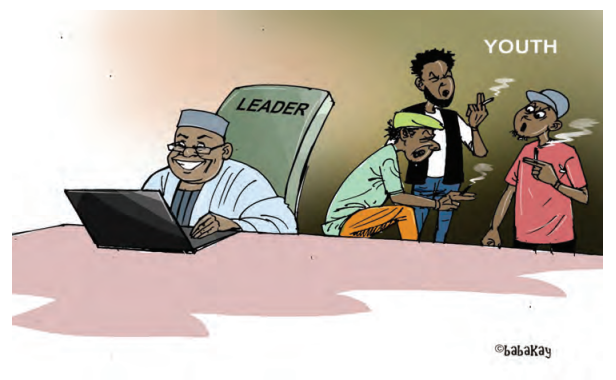In the vast tapestry of Nigeria’s demographic landscape, a striking feature emerges – a youth bulge that defines the nation’s population.
Though precise data may be elusive, the consensus remains: Nigeria is home to a large population of youths, with a median age of 18.1 years.
Despite this demographic advantage, successive governments have largely overlooked the potential of this huge youth population. This neglect inadvertently feeds a myriad of social challenges, most notably the alarming rise in acts that feed insecurity amidst other anti-social tendencies.
Sad State Of Nigerian Youths
The numbers are staggering – about 70 percent of Nigeria’s population is under 30, and a substantial 42 percent is under the age of 15. This dynamic, energetic, and ambitious demographic, unfortunately, finds itself in the stagnant pools of neglect, disenchantment, and systemic disregard.
The consequences of such neglect have manifested in social and economic dislocation thus leading to increased criminal activities that range from terrorism, insurgency, banditry, and armed robbery; kidnapping, advanced fee fraud, separatist agitations, and other inimical and anarchist behaviors.
The roots of this neglect run deep, and can be traced back throughout the annals of Nigeria’s political history. Successive governments have failed to prioritize youth development, formal and informal education, thus leaving a vast pool of untapped potential vulnerable to exploitation by hardship, hopelessness and criminal elements.
The consequences of this negligence are apparent and has resulted in pervasive insecurity across the nation.
The youth, disillusioned and deprived of opportunities, have become unwitting recruits for criminal enterprises. The narratives of insurgency and terrorism in the northern regions, banditry in the northwest, and separatist agitations in the southeast often find their roots in the desperation and frustration of the young disillusioned and angry populace.
The absence of viable pathways for self-improvement and prosperity has left the youth susceptible to the allure of criminality as a perceived means of survival. For too long, Nigerian youths have been relegated to the peripheries of policy considerations, with inadequate investment in education, skills development, and employment opportunities.
The cycle of poverty and disenfranchisement has been perpetuated over the years by a clueless political class, thus creating a breeding ground for radicalization and endemic criminal activities among an energetic and otherwise patriotic segment of the populace.
To break this cycle, a fundamental shift in policy and attitude towards the youth is urgent and imperative. To harness the enormous potential of Nigeria’s youth and, mitigate the security challenges stifling the nation, a comprehensive youth development approach is needed.
Harnessing The Youth Is Harnessing The Future
Any serious people, any serious leadership must prioritize the youth because the youth are the very basis of the future of any country or society. The foundation of any nation lies in its educational system, therefore investments in quality education, vocational training, and skill development programmes are crucial in the drive to equip the youth with the tools needed for meaningful productivity and economic engagement. Skilled and educated youth with means of livelihood is less likely to be lured into criminal activities.
The government must prioritize job creation and economic empowerment initiatives tailored to the unique needs of the youth. Entrepreneurship programmes, access to funding, and mentorship opportunities can help foster a culture of innovation and self-sufficiency among the young, thus redirecting their energies toward productive endeavours.
Corruption remains a significant impediment to progress in Nigeria. Efforts to eradicate corruption in governance and create transparent systems that will ensure that resources are allocated efficiently to reach those who need them the most, particularly the youth.
Divisive narratives and separatist agitations often thrive in environments of perceived inequality and injustice. Policies that promote national unity, inclusivity, and equitable distribution of resources can counteract the appeal of extremist ideologies and separatist movements.
The youth are naturally inclined towards technology and innovation. Leveraging these tendencies can propel Nigeria into a new era of economic prosperity. Investments in technology infrastructure, digital literacy, and support for tech-driven startups can create a conducive environment for youth-led innovations.
The neglect of Nigeria’s youths by successive governments has perpetuated a cycle of insecurity and underdevelopment. The time has come for a paradigm shift – one that places the youth at the centre of national development strategies. By investing in education, creating employment opportunities, fostering social inclusion, and addressing systemic issues, Nigeria can unlock the vast potential of its youth, creating a secure and prosperous nation that works for everyone. It’s a collective responsibility that demands immediate and sustained action to pave the way for a brighter future for Nigeria and its youth.
Enter Youth Development Bank
However there seems to be indications that President Bola Ahmed Tinubu administration may do things differently. Recently, the Minister of Youth Development, Dr Jemila Ibrahim said the federal government was working out plans to establish a national youth development bank, as part of efforts by President Bola Tinubu to increase access to capital for young Nigerians. Jemila also said the initiative would promote entrepreneurship among the youth. She said the bank would give young entrepreneurs economic prosperity in the form of access to capital and the opportunity to grow their businesses. The minister said the government was working on programmes aimed at galvanising development among youths in the country, adding that the job of the ministry was to create the enabling environment, and opportunity for young people to prosper.
While we watch with expectation that Tinubu administration may do things differently to truly empower the youths but we should be reminded how the immediate past administration led by former President Muhammadu Buhari promised so much but delivered so little. The Buhari administration had what it called Nigerian Youth Investment Fund (NYIF) which was a government initiative created to boost the Nigerian economy through leverage and access to finance for youths. The fund hoped to serve as a catalyst to unleash the potential of the youth and enable many of them build businesses that will increase the employment rate.
The Nigerian Youth Employment Action Plan was developed by the Federal Ministry of Youth and Sports Development (FMYSD) as a built-in strategy to respond effectively to the youth employment challenge in Nigeria in 2020. The major objectives of the plan were to address fragmentation of youth initiatives that prevent assessment of impact, and to provide Nigeria youth with investment inputs required to build successful businesses that can become sustainable employers of labour and contributors to Nigeria’s development.
The plan targets young people between the ages of 18-35 years and details the needed actions required to support business establishment, expansion and consequent employment creation for youth in critical economic and social sectors. The Federal Executive Council on the 22nd of July, 2020 approved the sum of N75,000,000,000.00 (seventy five billion naira) for the establishment of the Nigeria Youth Investment Fund for the period of 2020 – 2023 dedicated to investing in the innovative ideas, skills and talents of Nigerian Youth, and to institutionally provide our youth with a special window for accessing much needed funds, finances, business management skills and other inputs critical for sustainable enterprise development.
If the Tinubu administration could make the youth development bank a reality it would go a long way in empowering young Nigerians with the resources to go into business instead of waiting for nonexistence government employment. Also, in this era of Information Communication Technology (ICT) the youth with great ideas and innovations in the sector but lacking funds will have access to funds and thus embrace entrepreneurship and reduce the quest to move abroad in search of greener pastures.
MAY NIGERIA REBOUND





